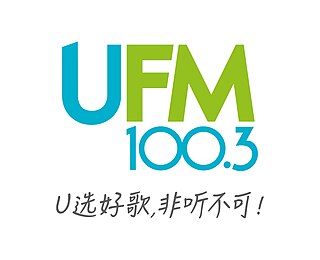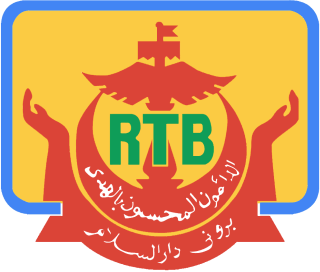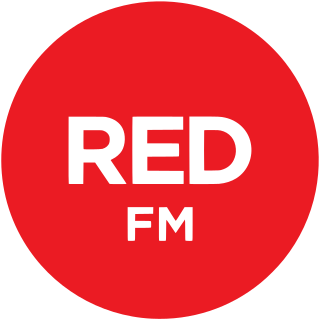
Mediacorp Pte. Ltd. is Singapore's media and entertainment group that serves as the national public broadcaster for both radio and television in the country. As a mass media conglomerate, it holds interests in radio broadcasting, television broadcasting and digital content creation.

The Malaysian National News Agency, abbreviated BERNAMA, is a news agency of the government of Malaysia. It is an autonomous body placed under the Ministry of Communication and Multimedia. Bernama is an abbreviation of Berita Nasional Malaysia. Bernama also means named or titled in the Malay language. It was set up by an Act of Parliament in 1967 and started work on 20 May 1968. Being the Malaysian government's official news agency, Bernama's content and views are decidedly right-leaning and pro-government of the day.
Television in Singapore began on 15 February 1963. The public broadcaster, MediaCorp TV, has a monopoly on terrestrial television channels and is fully owned by government holding company Temasek Holdings. Local pay TV operators are StarHub TV and Singtel TV. The private ownership of satellite dishes is banned.

Channel 5 is a free-to-air, English-language television channel in Singapore. Owned by state broadcaster Mediacorp, it broadcasts general entertainment, news, and sports programming.

Channel 8 is a Singaporean free-to-air television channel, airing in the Mandarin language. It was created by Television Singapura on 31 August 1963 with experimental broadcasts, before going official on 23 November that year.

TV3 is a Malaysian free-to-air television channel owned by Media Prima conglomerate. It was launched on 1 June 1984 as the country's first and oldest private television channel. In 2013, TV3 remained the most-watched television station in Malaysia, despite the declining viewership of free-to-air television.

Radio Televisyen Malaysia (RTM), also known as Department of Broadcasting, Malaysia is a Malaysian public broadcaster based in Kuala Lumpur. Established on 1 April 1946 as Radio Malaya, it is the first and the oldest broadcaster in the country. When Malaysia was formed on 16 September 1963, Radio Malaya was renamed Radio Malaysia while Televisyen Malaysia was established on 28 December the same year. In 1969, Radio Malaysia and Televisyen Malaysia merged to form the present day broadcast department.
Radio Klasik is a national Malay language-radio station operated by Radio Televisyen Malaysia. Its main motto is Menggamit Kenangan.

UFM100.3 is a Mandarin radio station in Singapore that plays Mandopop from the post 2000s to the current hits. The station is maintained by SPH Radio Pte Ltd, which also owns a number of Chinese media publications such as Lianhe Zaobao, Lianhe Wanbao, Shin Min Daily News, and UWeekly.
Singapore Press Holdings Limited is a Singaporean media organisation with businesses in print, digital, radio, and outdoor media, and property and aged care. SPH has over 4,000 employees, including a team of approximately 1,000 journalists, including correspondents operating around the world. The company was one of the country's "blue-chip" counters on the Singapore Exchange, and was a constituent of the Straits Times Index until its removal on 22 June 2020.
Minnal FM is a Malaysian state owned Indian language radio station. This fm were operated by Radio Televisyen Malaysia. Most of the show in this radio channel are aired in Tamil Language. But, the channel also air songs in Malayalam, Hindi, Punjabi and Telugu. It was the first 24-hour Indian language broadcast service in the world. It serves as a source of information and entertainment for Malaysian Indians.

Radio Television Brunei is the state broadcaster of Brunei. Radio Brunei made its first broadcast on 2 May 1957, with a television service starting on 1 March 1975. Radio Television Brunei also monopolies the free-to-air television in the country, and also radio until 1999, when the country's only commercial radio station, Kristal FM was founded. The network's logo was based from the national emblem of Brunei.
Zhang Haijie is a Singaporean - based News Anchor contracted under MediaCorp. Zhang has a reputation for being a highly respected news anchor in the industry, and proves to be popular among the audience due to her distinctive clear voice and professional image she portrays in the newsroom.

SPH MediaWorks Ltd was a free-to-air terrestrial television broadcaster in Singapore that operated two television channels: Channel U and Channel i. It merged with the city-state's long-established broadcasting company, Mediacorp, in 2004.

Red FM is a defunct Malaysian English language-private radio station that used to broadcast across Peninsular Malaysia and Singapore. It was managed by Star Media Radio Group, a wholly owned subsidiary of Star Publications (M) Bhd. Red FM began broadcasting on 1 September 2001 and was one of Malaysia's top five English radio stations.
Kiss 92FM is an English-language radio station based in Singapore which plays current hits and music from past decades primarily competing with Class 95. It is a 24-hour radio station of SPH Radio Pte Ltd, which also owns One FM 91.3, Money FM 89.3, 96.3 Hao FM and UFM100.3.
Chinese Voice is a Cantonese, Mandarin and English language radio network based in Auckland, New Zealand. It is a wholly owned subsidiary of World TV, an Asian language television, print and radio company, and consists of three station set up between 2003 and 2010. It produces more than 80 hours of local content each week, including live talkback on news stories, migrant issues, political developments and dealing with New Zealand Government agencies. The stations also broadcast imported talk and music programmes from China and Hong Kong.
SPH Radio Pte Ltd is a fully owned subsidiary of main board-listed Singapore Press Holdings Ltd (SPH) and operates five radio stations, One FM 91.3, UFM100.3, Kiss 92, MONEY FM 89.3 and 96.3好FM.









